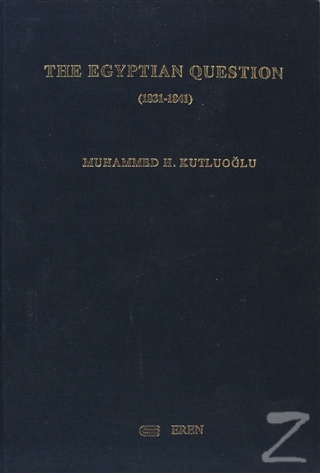The Egyptian Question (1831-1841) (Ciltli) The Expansionist Policy Of Mehmed Ali Paşa in Syria And Asia Minor And The Reaction Of The Sublime Porte

The present study seeks to explore the Egyptian question, between 1831 and 1841, and to focus upon the struggle between Mehmed Ali Paşa and the Sultan. To this extent, it approaches the Egyptian question as an internal Ottoman problem, rather than as an international issue. The choice of opening and closing dates seems obvious enough. Despite a steadily deteriorating relationship after the battle of Navarino in October 1827, it was not until 1831 that open hostilities broke out between Mehmed Ali Paşa and the Sublime Porte. Though these hostilities ended in a settlement in 1833, the underlying struggle between Istanbul and Cairo went on until 1841, when it was ended by the European Powers' interference. The present study focuses primarily upon Anatolia and Syria. Although Mehmed Ali Paşa expanded his sphere of influence towards the Persian Gulf and the Arabian peninsula, it was above all Syria and Anatolia which served as the theater for his struggle with the Sublime Porte.
The Egyptian question between had very significant consequences on the Ottoman political developments. Firstly, it was the first time that the Ottomans had to seek assitance from a Great Power to deal with a domestic problem which was the expansionist designs of a Muslim leader over the Ottoman domains.
Secondly, it showed that the centralising policies of Mahmud 2 had a negative impact among the local Muslim communities. Thirdly, it became certain that the Sublime Porte and the Sultan could not any longer develop clear cut policies to deal with such crises. Often they used reactive measure to ease the situations. Fourthly, the Ottoman inability to deal with the crises alone reopened the Eastern Question and internationalised the Egyptian issue.
Lastly, the internationalisation of the Mehmed Ali crises led the Ottomans to grant further economic and political concessions to the Great Powers.
The present study seeks to explore the Egyptian question, between 1831 and 1841, and to focus upon the struggle between Mehmed Ali Paşa and the Sultan. To this extent, it approaches the Egyptian question as an internal Ottoman problem, rather than as an international issue. The choice of opening and closing dates seems obvious enough. Despite a steadily deteriorating relationship after the battle of Navarino in October 1827, it was not until 1831 that open hostilities broke out between Mehmed Ali Paşa and the Sublime Porte. Though these hostilities ended in a settlement in 1833, the underlying struggle between Istanbul and Cairo went on until 1841, when it was ended by the European Powers' interference. The present study focuses primarily upon Anatolia and Syria. Although Mehmed Ali Paşa expanded his sphere of influence towards the Persian Gulf and the Arabian peninsula, it was above all Syria and Anatolia which served as the theater for his struggle with the Sublime Porte.
The Egyptian question between had very significant consequences on the Ottoman political developments. Firstly, it was the first time that the Ottomans had to seek assitance from a Great Power to deal with a domestic problem which was the expansionist designs of a Muslim leader over the Ottoman domains.
Secondly, it showed that the centralising policies of Mahmud 2 had a negative impact among the local Muslim communities. Thirdly, it became certain that the Sublime Porte and the Sultan could not any longer develop clear cut policies to deal with such crises. Often they used reactive measure to ease the situations. Fourthly, the Ottoman inability to deal with the crises alone reopened the Eastern Question and internationalised the Egyptian issue.
Lastly, the internationalisation of the Mehmed Ali crises led the Ottomans to grant further economic and political concessions to the Great Powers.






